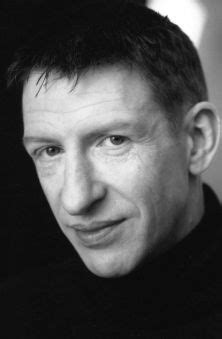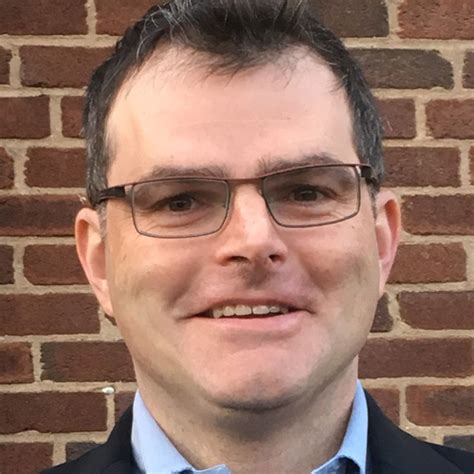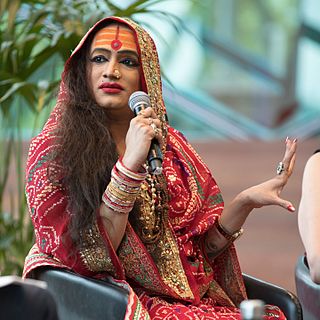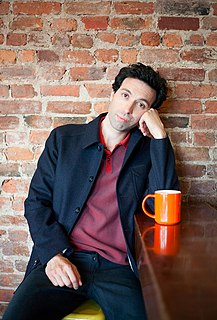A Quote by Mark Epstein
Meditation did not relieve me of my anxiety so much as flesh it out. It took my anxious response to the world, about which I felt a lot of confusion and shame, and let me understand it more completely. Perhaps the best way to phrase it is to say that meditation showed me that the other side of anxiety is desire. They exist in relationship to each other, not independently.
Related Quotes
We meditate alone but live our lives with other people; a gap is inevitable. If our path is to lead to less suffering, nd much of our suffering is with other people, then perhaps we need to reexamine our sole commitment to these individual practices... As our individual pracitce deepens, it may yiled true ease. But whether we practice meditation in seclusion or independently alongside other meditators at a meditation group or retreat, individual meditation approaches the confusion and pain of our relational lives only indirectly.
Rational anxiety is when you're aware of the source of your anxiety. Like, if I have to host an award show or talk to millions of people on the radio, I'm going to feel anxious, and I know why. Irrational anxiety is when I'm leaving CVS, and there's a car behind me, and I'm wondering if he's following me home.
While the primary function of formal Buddhist meditation is to create the possibility of the experience of "being," my work as a therapist has shown me that the demands of intimate life can be just as useful as meditation in moving people toward this capacity. Just as in formal meditation, intimate relationships teach us that the more we relate to each other as objects, the greater our disappointment. The trick, as in meditation, is to use this disappointment to change the way we relate.
One practice I rely on all the time is basic meditation which allows me to strip away the noise. It's like the old-fashioned dial on the radio, where you were getting static and then you found that clear, sweet spot on the dial, where the music would come through. That's what meditation is for me. Dialling out the static, the noise, the anxiety, the fear, and coming into a place that's deep and quiet. It's like dropping into a well of inspiration and wisdom.
As a freshman in college, I was having a lot of trouble adjusting. I took a meditation class to handle anxiety. It really helped. Then as a grad student at Harvard, I was awarded a pre-doctoral traveling fellowship to India, where my focus was on the ancient systems of psychology and meditation practices of Asia.
When I started meeting members of the hijra community, it was a whole different ballgame. They were like me. This was the first time I felt that I was with other people who were the same as me. It was not about cruising a man, it was not about sleeping with somebody - it was beyond that. It was so much a community, wanting the best for each other, loving each other, caring for each other.
My dad has pretty much taught me, he's built this thing with me, he trains with me, practices with me, goes to the gym with me, we battle each other at the go-kart track. We're so competitive with each other, and I feel like we both make each other better because we're so hard on each other, just trying to be the best we can.
Anxiety is so pervasive in my work, it's like it's not even a thing because it's always there. Like air. I have to work through a layer of anxiety to get to anything else. It's embarrassing to me when people point out to me all the anxiety I portray in my work. I don't ever want to write about anxiety again but it'd be like leaving a huge gap in the picture.
I've learned to become a progressive man because I have four women in my life. And their mother, who I'm not married to anymore, but who impresses me because of our relationship. Because we have a very deep and friendly relationship that is completely about who we really are now. Before it was husband, wife, mother, father. But now it's about who we are as human beings. Because we didn't give up on each other. And because we didn't hurt each other and blister each other from a divorce. We became tight. Best friends. And more than that even, because now we're best parents.
The presence of anxiety is unavoidable, but the prison of anxiety is optional. Anxiety is not a sin; it's an emotion. So don't be anxious about feeling anxious. Anxiety can, however, lead to sinful behavior. When we numb our fears with six-packs or food binges, when we spew anger like Krakatau, when we peddle our fears to anyone who will buy them, we're sinning.
The meditation that gives you immediate joy or continuous joy is the best meditation for you. Everyone will not have the same meditation. Your meditation will not suit me, my meditation will not suit you. You like a certain food, I don't like it. You are right in your own way I am right in my own way. But once you know what your best meditation is, please stick to it.
I do have commitment phobia, which I think is underlied by death anxiety. I feel that if you are in a relationship, there is a real genuine possibility of plateauing, and there is a possibility for a creative, emotional and spiritual death because of it. Only part of me feels this way, but it's enough to create an anxiety which makes me think twice before committing.
Now that I think about it, my 40th birthday was the most anxiety I've ever had, and my wedding was also the second time I've had that much anxiety. So I'm starting to realize that I can't be throwing these big bash parties because I need to own that I get anxiety with a lot of people diverting their attention to me.
By means of meditation, I feel that we have planted dynamite to transcend the world of confusion. So it would be good if you could practice meditation as much as you can, as much as physically and psychologically possible. You could become more clear and sane, and you could also influence the national neurosis in that way.
Anxiety and desire are two, often conflicting, orientations to the unknown. Both are tilted toward the future. Desire implies a willingness, or a need, to engage this unknown, while anxiety suggests a fear of it. Desire takes one out of oneself, into the possibility or relationship, but it also takes one deeper into oneself. Anxiety turns one back on oneself, but only onto the self that is already known.

































